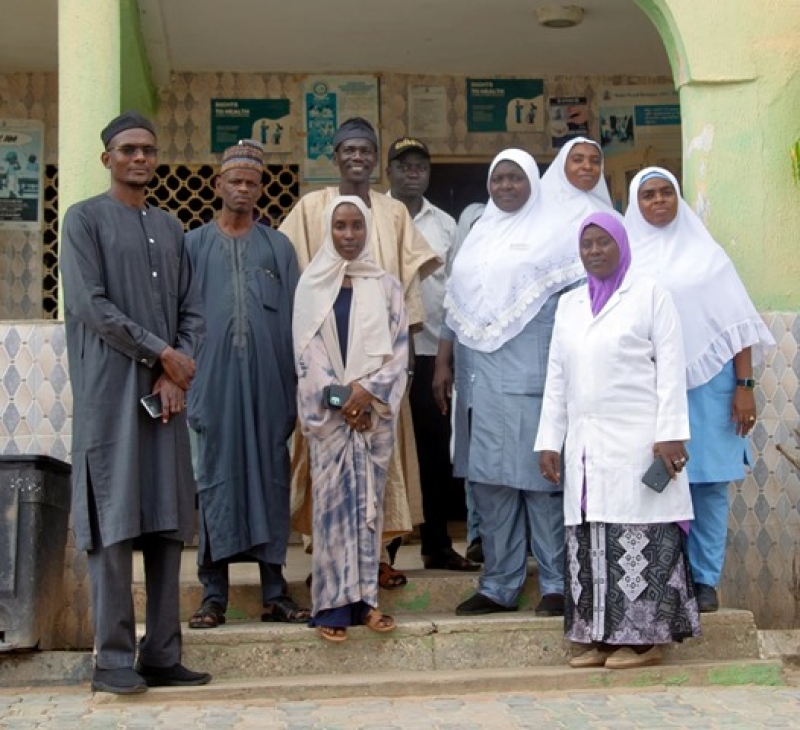- Experts see Tarique's political future on optimistic note |
- UN Chief Urges Leaders to Curb Warming, Protect Planet |
- Tk 3.38cr Project to Restore Sonadia’s Biodiversity |
- Global Emissions Fall Slowly, Experts Urge Renewables Push |
- Hurricane Melissa: UN Appeals $74M to Aid 2.2M in Cuba |
Investing in Health Key to Job Creation and Economic Growth

Staff at Tudun Wada PHC in Gombe state, Nigeria. Photo- Ikechukwu Okeagu-World Bank
Ensuring that every person has access to health care is fundamental to ending poverty, increasing productivity, and building robust economies.
With strong health systems in place, infants survive and grow up to thrive, girls and boys have the chance to develop skills and find good jobs, and parents can keep working and live well into old age in communities that support healthy aging.
The Health Sector is Key to Job Creation
The health sector is also a major contributor to employment, with healthcare jobs comprising up to 20 percent of total employment in high-income countries, yet only around five to six percent in sub-Saharan Africa and South Asia.
The health sector offers steady employment and upskilling opportunities, especially for women who represent more than 70% of the health workforce, but hold only 25% of senior roles.
Investing in health also creates indirect job opportunities in pharmaceuticals, biotechnology, medical technology, digital health, and support services.
To realize this potential, we are helping countries scale up essential nutrition services, integrate nutrition into health systems and across other sectors, and leverage financing through public and private solutions.
For instance, in Nigeria, a World Bank-supported project has provided more than 13 million women, adolescent girls, and children with quality, cost-effective nutrition services over the past five years.
“My journey from a mother facing uncertainty to a midwife dedicated to improving maternal and child health in my community has been both challenging and deeply rewarding. I am proud to be on the frontlines of this fight to crash maternal mortality in Nigeria.”Fauzziya Abubakar Abare
As a significant economic driver—generating jobs and fostering inclusive growth—the health care sector requires adequate investment to yield high returns in productivity and important health outcomes.
Yet, global megatrends are significantly impacting access to quality, affordable health services for all.
Health systems worldwide are facing unprecedented pressure. Despite rising health needs, investments and development aid for health are declining.
Pandemic risk is rising, anti-microbial resistance is spreading, and chronic disease is increasing.
Climate change and fragility are multiplying risks to health and well-being.
And populations are aging.
These are putting enormous stress on health systems around the world.
Today, nearly half of the world population doesn’t have access to essential health services, and more than 2 billion people face severe financial hardship because they are paying out-of-pocket for medical expenses.
The World Bank Group is driving solutions to build stronger, more equitable health systems. Through financing, knowledge sharing, and partnerships we are committed to strengthening health systems and advancing health sector job creation.
The Bank is supporting countries across the world to provide affordable, quality health services to 1.5 billion people by 2030, a milestone that will drive economic development globally.
In Mali, many people, especially in remote areas, struggle to access healthcare due to high costs and long distances. A survey showed that over half of the population could not afford medical care, with even higher rates among the poorest. This made it difficult for vulnerable groups to get the health services they needed.
In partnership with the Global Financing Facility and the Netherlands, the World Bank helped to make healthcare more affordable and accessible. Health centers received funds based on their performance which helped improve the quality of care, recruit more staff, and provide better equipment. – World Bank Newsletter

